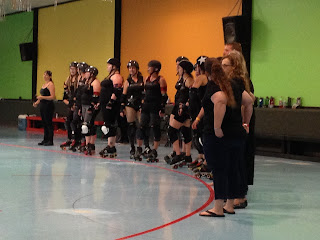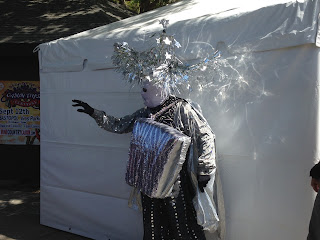-- A single chance is a galaxy of hope.
Picking up on the heels of the previous episode, we see the release of the deadly virus Dr. Vindi was making. This episode becomes one of those "find a cure" episodes that so many TV shows employ at least once. And who's infected with the virus? Padme and Ahsoka, of course. Fortunately, a clue to a cure is near at hand, though you have to wonder how the virus was ever a scourge to the galaxy when they key to the cure turns up so easily.
Yes, yes, I know! Just because they Jedi have knowledge of the cure now doesn't mean anyone knew about it when the virus was a threat. Still...
The problem for me with this episode, at least on this re-watch of it, is that there really isn't any tension. You know that Anakin and Obi-Wan will find a cure for the disease. Of course, you know that. But the whole thing felt too easy for me. I don't remember how I felt about it the first time I watched it. There's also the issue that I'm not overly fond of the racing-the clock-to-find-a-cure-for-a-deadly-disease plot. I have a difficult time buying into those, because, on the whole, they never work the way diseases actually work.
There are some good points in this story, though.
We get Obi-Wan's first (I think (I'm pretty sure (at least, I don't remember any earlier ones))) look of suspicion at Anakin to do with his feelings about Padme. It's unfortunate that the series can't really deal with this dynamic in any depth because Obi-Wan still has to be surprised during Revenge of the Sith that Padme's pregnant by Anakin.
The side character Jaybo Hood is interesting.
We get to meet the Angels of Iego, which Anakin compares Padme to all the way back in The Phantom Menace.
The one other point of interest in the episode has to do with some of the clones who have also contracted the virus. Padme makes a comment about it being a shame that so many of them are sick and one of the other clones tells her that she shouldn't be so bothered about it because it's what the clones were made for. Again, the dynamics between the clones and their "masters" is one of the most interesting aspects of the show, and I'm glad they continue to explore the relationship.
The episode has its good moments, but it's not one of the more interesting ones. Even though it carries the "plague" idea over from the previous episode, it's still really a one-off, and I prefer when they do the story arcs that include character development.
Yes, yes, I know! Just because they Jedi have knowledge of the cure now doesn't mean anyone knew about it when the virus was a threat. Still...
The problem for me with this episode, at least on this re-watch of it, is that there really isn't any tension. You know that Anakin and Obi-Wan will find a cure for the disease. Of course, you know that. But the whole thing felt too easy for me. I don't remember how I felt about it the first time I watched it. There's also the issue that I'm not overly fond of the racing-the clock-to-find-a-cure-for-a-deadly-disease plot. I have a difficult time buying into those, because, on the whole, they never work the way diseases actually work.
There are some good points in this story, though.
We get Obi-Wan's first (I think (I'm pretty sure (at least, I don't remember any earlier ones))) look of suspicion at Anakin to do with his feelings about Padme. It's unfortunate that the series can't really deal with this dynamic in any depth because Obi-Wan still has to be surprised during Revenge of the Sith that Padme's pregnant by Anakin.
The side character Jaybo Hood is interesting.
We get to meet the Angels of Iego, which Anakin compares Padme to all the way back in The Phantom Menace.
The one other point of interest in the episode has to do with some of the clones who have also contracted the virus. Padme makes a comment about it being a shame that so many of them are sick and one of the other clones tells her that she shouldn't be so bothered about it because it's what the clones were made for. Again, the dynamics between the clones and their "masters" is one of the most interesting aspects of the show, and I'm glad they continue to explore the relationship.
The episode has its good moments, but it's not one of the more interesting ones. Even though it carries the "plague" idea over from the previous episode, it's still really a one-off, and I prefer when they do the story arcs that include character development.





























